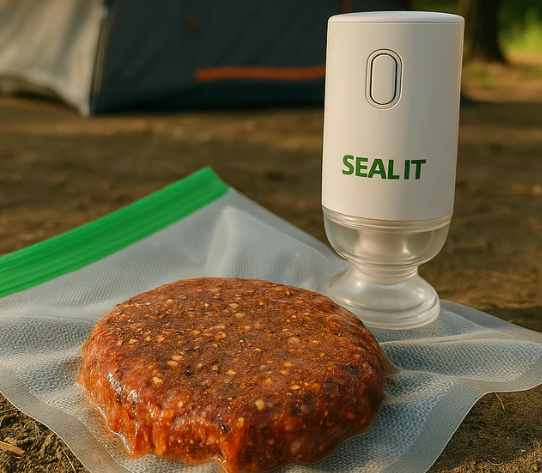
Reducing Food Waste with Vacuum Sealing
Share
Frequently Asked Questions
Q1: Does vacuum sealing really help reduce food waste?
Q2: Is vacuum sealing considered an eco-friendly storage method?
Q3: What kinds of foods benefit most from vacuum sealing?
- Fresh produce
- Meats and seafood
- Cheese
- Grains, nuts, and dry goods
- Leftover cooked meals
Q4: How does vacuum sealing support sustainable practices in daily life?
- Reducing food waste
- Minimizing packaging waste
- Supporting bulk buying and portion control
- Helping households reduce their carbon footprint
Q5: Can vacuum sealing save money as well as reduce waste?
Introduction
In a world where climate change and overconsumption dominate headlines, finding simple and effective ways to reduce our environmental footprint is more important than ever. One area of everyday life where individuals can make a big difference is food storage. Understanding how vacuum sealing bags reduces food waste empowers consumers to preserve food longer, shop smarter, and contribute to a greener planet.
The Food Waste Problem
Globally, nearly one-third of all food produced is wasted. In Australia alone, over 7.6 million tonnes of food are thrown out each year, much of it from households. Not only is this wasteful, but decomposing food in landfills generates methane, a potent greenhouse gas.
Addressing food waste doesn’t always require large-scale changes. Sometimes, small tools like a vacuum sealer can lead to major results. By extending shelf life and reducing spoilage, vacuum sealing plays a vital role in waste reduction at the household level.
How Vacuum Sealing Reduces Food Waste
So, how does vacuum sealing reduce food waste? The process involves removing air from storage bags or containers, significantly slowing the growth of bacteria, mold, and yeast that cause food to spoil.
Without exposure to oxygen, perishable items last significantly longer:
- Fresh produce stays crisp for up to two weeks
- Meats last months in the freezer without freezer burn
- Cheeses, nuts, and dry goods avoid spoilage and contamination
By keeping your food fresher longer, vacuum sealing directly contributes to eco-friendly storage and reduces the likelihood that items will spoil before you can use them.
Supporting Sustainable Practices at Home
Adopting vacuum sealing aligns perfectly with everyday sustainable practices. Unlike single-use plastic wraps or disposable containers, vacuum sealing often uses reusable bags and containers, especially when using systems designed for eco-conscious consumers.
Vacuum sealing:
- Reduces food waste
- Minimizes reliance on disposable packaging
- Encourages bulk shopping and meal prep
- Supports zero-waste lifestyle goals
By investing in a vacuum sealing system, such as those offered by Sealit, you not only make your food last longer—you make your kitchen greener.
Eco-Friendly Storage: A Practical Solution
One of the main advantages of vacuum sealing is its role in eco-friendly storage. Replacing cling wrap, foil, or non-recyclable containers with vacuum-sealed bags—especially reusable ones—reduces your single-use plastic footprint.
Vacuum sealing is also ideal for bulk storage. Buying larger quantities of grains, beans, or meat and sealing them into portions eliminates excessive packaging and food waste from spoilage.
Unlike some “green” solutions that are difficult or expensive to maintain, vacuum sealing is accessible, affordable, and simple. It’s one of the most practical tools for anyone seeking to adopt more sustainable practices without overhauling their entire routine.
Boosting Food Longevity the Sustainable Way
Preserving freshness is where vacuum sealing shines. When thinking about food longevity, vacuum sealing delivers clear results:
- Vegetables: Leafy greens and herbs that usually wilt in a few days can last up to two weeks when vacuum sealed.
- Meats & Seafood: Frozen meats stay free of freezer burn for 6–12 months.
- Cooked Meals: Leftovers remain safe and delicious 3–5 days longer.
- Dry Goods: Flour, sugar, and spices avoid moisture and pests when vacuum sealed.
Longer-lasting food means fewer trips to the store, fewer spoiled items, and a more efficient kitchen. It’s a direct, impactful method for anyone looking to reduce waste and improve food longevity at home.
Why Choose Sealit?
If you're ready to make the move to vacuum sealing, Sealit offers everything you need to start. From user-friendly vacuum sealers to eco-friendly storage bags and containers, Sealit helps Australian households take real steps toward sustainable living.
Their products are:
- Designed for everyday use
- Made from durable, reusable materials
- Ideal for both fresh and frozen food
- Supported by a passionate team focused on sustainability
Choosing Sealit means you’re choosing a brand that understands not just how vacuum sealing reduces food waste, but also how it contributes to a better planet.
Final Thoughts
If you’re committed to a greener lifestyle, now is the time to rethink how you store your food. By learning how vacuum sealing reduces food waste, you’re taking a proactive step toward environmental stewardship. You’re not just extending the shelf life of your meals—you’re contributing to a global movement focused on sustainability, efficiency, and smarter living.
Vacuum sealing is more than a kitchen convenience. It’s a sustainable choice that helps you live with intention, reduce your impact, and build habits that matter.
